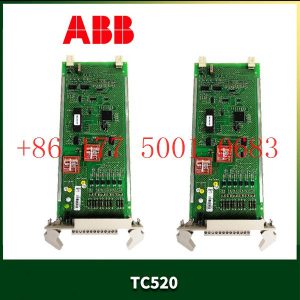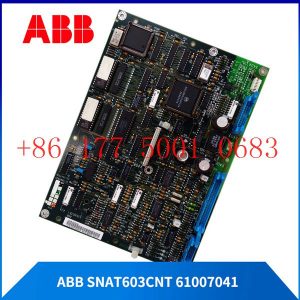Description
hardware flow control. It is an ideal choice in the field of industrial automation.
Why is the industrial Internet inseparable from industrial control?
ABB Global CEO Ulrich Spiesshofer recently accepted an exclusive interview with a reporter from Caijing in New York. He believes that the global manufacturing industry is
undergoing drastic changes. The era of labor arbitrage is over. Labor costs are no longer the focus of competition. The future of manufacturing lies in In factories that are smaller,
closer to consumers, and more agile. Artificial intelligence ( AI ) is the most important technology shaping the future of manufacturing. Currently, AI technology is mainly used in the
consumer field, but its large-scale application in the industrial field and among enterprises is more critical.
Digital transformation has been a keyword for global manufacturing giants in the past two years, and the industrial Internet is the implementation form of digital transformation.
General Electric (GE), Siemens and ABB are all leaders in this regard . Spiesshofer believes that GE”s industrial Internet only collects data and analyzes but cannot control it.
As the world”s two largest industrial automation suppliers, ABB and Siemens have the ability to control equipment, which is a significant difference from GE.
ABB is headquartered in Zurich, Switzerland. Its history can be traced back to the 1880s. It started from the original electrical manufacturing business and has developed into an international manufacturing
giant including electrical products, robotics and motion control, industrial automation and power grid. In 2017, ABB”s revenue was US$34.3 billion, ranking 341st among the
Fortune 500 companies. Spiesshofer has served as CEO for nearly five years since taking office in September 2013.
Below are the details of the interview.
The era of labor arbitrage is over
Caijing: Is 2018 a good year for the manufacturing industry?
Spiesshofer: From a global perspective, GDP is growing and consumption is also growing. Overall positive.
Caijing: What crucial changes are taking place in the manufacturing industry?
Spiesshofer: The jobs of the future will be different from the jobs of the past. In the Middle Ages, craftsmen moved between villages, taking their tools with them to work where
there was demand; later we invented factories, integrated supply and demand, and invented logistics; later people realized that there was labor arbitrage (Labor Arbitrage, Refers to
the existence of moving industries that have lost technological advantages and technical barriers to areas with low labor prices to increase profits by reducing labor costs), so we place
factories in emerging countries to benefit from labor arbitrage.
Now, with the development of modern automation and robotics, we can break this picture and bring value addition closer to demand. I think the future of manufacturing is
in factories that are smaller, closer to consumers, and more agile. I believe that the global logistics chain will also be reduced in the future because we will produce products closer to consumers.
The era of labor arbitrage shaping the global manufacturing landscape will be over because we can offset this arbitrage.
Recently we opened a new factory in Germany. Due to the adoption of intelligent automation technology, its unit cost is exactly the same as that of the best factories in
China. So I think the local market will be repositioned in the future, and the positioning of competitiveness will also change from just considering costs to focusing more on technology and value.
Caijing: Many people are complaining that automation has caused people to lose their jobs, and artificial intelligence technology has made the complaints louder
. But these new technologies are also creating new jobs. How do you see the relationship between the two?
Spiesshofer: In 1990, one-third of the world”s population lived below the extreme poverty line. Today, only 8% rely on technology. In fact, countries with the
highest robot densities, such as Germany, South Korea, Singapore, and Japan, also have the lowest unemployment rates. Robots combined with educated people can create prosperity, produce more
affordable goods, and lead to economic growth. Government, education and business need to work together to keep up with the changing world.
Clearly, millions of jobs are disappearing, but millions of new ones are being created. Taking our own business as an example, we used to have many
employees doing metal casting and forging work, but now these tasks are automated. But now we have more employees working in the service industry, developing apps, and working with customers.
So I think we should not be afraid of change, but should lead our employees to manage change and promote change. If we succeed, global employment will eventually grow.
https://www.xmamazon.com
https://www.xmamazon.com
https://www.plcdcs.com/
www.module-plc.com/
https://www.ymgk.com
F8652E HIMA Safety system module
F8650X HIMA processor module
F8650E HIMA Safety system
F8628X HIMA communication module
F8627 HIMA Ethernet communication module
HIMA F8621A analog output module
F7133 HIMA Channel power distribution module
F3330 HIMA Channel output module
F3221 HIMA Digital input module SIS instrumentation system
EHDB520 ABB System module
EHDB280 ABB Contactor
EH370-30-22 ABB contactor
ED1822A-HEDT300867R1 ABB Control panel
E1740A Time Interval Analyzer
E1406A Command module
DSXS-001-57170001-A ABB Power switch
DSTD-W113-57160001-ZL ABB Connection unit
DSTD150A 57160001-UH ABB coupler
DSTD108-57160001-ABD ABB Connectors
DSTC190-57520001-ER ABB Connection unit
P0926JM FOXBORO Power source
OS9-GNI-C20L
NAIO-03F ABB Industrial controller
MVI69E-GSC PROSOFT processor
MVI56-BAS PROSOFT Basic communication module
MTL-8715-CA-BI Bus interface module
MMII-PD-MOD501-120 GE Control motor
MMII-PD-1-2-MOD616-120
MMII-PD-1-2-MOD600-120 GE Motor Manager II relays
MMII-PD-1-2-120 GE Motor control center
MMII-PD-1-2-240 GE Motor manager
MMII-C-0-0-120 GE Low voltage motor control module
KUC755AE105 ABB Controller module
KUC720AE01 ABB Motion control card
KUC711AE101 3BHB004661R0101 ABB Excitation controller
KUC711AE101 ABB Excitation system
KUC321AE ABB Power control drives the board
H800 Ultra Micro NV server NVIDIA
H100 PCIE single card NVIDIA
H100 Micro NV server NVIDIA NVIDIA
GH200 superserver NVIDIA
A800 NVLink 8 card module NVIDIA
A800 PCIE single card NVIDIA
A100 Supermicro NV server NVIDIA
A100 PCIE single card NVIDIA
IS420UCSBH1A GE UCSB controller
IS215VCMIH2CA GE VME communication card in turbine control system
IS215VCMIH2BB GE Board assembly
INNPM12 ABB analog expansion module
INNIS21 ABB The terminal is connected to the INNIS21 module
IMMFP12 ABB Multifunctional processor module
IMHSS03 ABB Hydraulic Servo Module
IEPAS01 ABB Power module
IC800STI105S1-CE Power module
IC800SSI216 GE Servo motor controller







Reviews
There are no reviews yet.